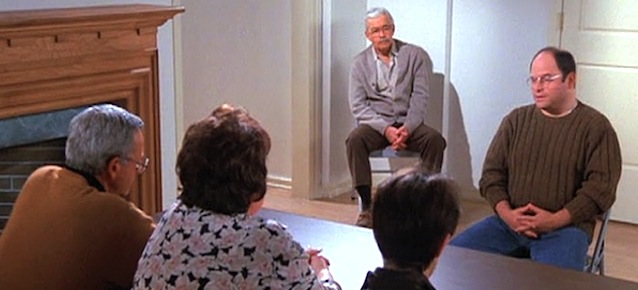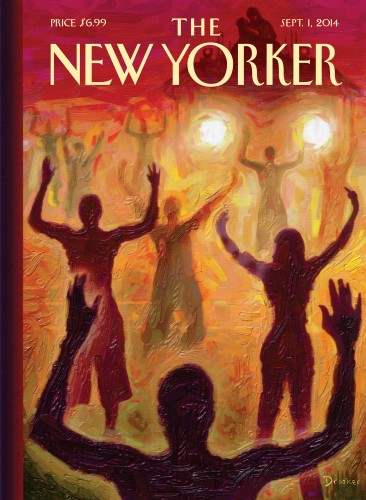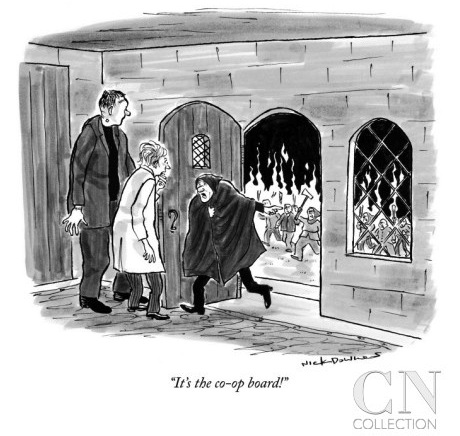
I have a love/hate relationship with The New Yorker. Each week, the magazine arrives. First: I admire it’s glossy cover. Then, the cartoons (“Hey, honey, look at this one. We’re not like that at all.”) Next: the always funny “Shouts and Murmurs.” Then a survey of the table of contents. Another food essay. Pass. (I will never eat there anyway.) In depth political journalism? Maaaaayyybee. The obligatory high-brow look at low-brow culture? Yes, please. (Recent examples: a super-aggressive female MMA fighter and a luchador in drag.)
But then there’s the fiction piece. And I’m torn. I know it will be good. I know it will be art. (Like that one about the Chinese couple that refused to talk to each other forever. Or the one about the couple feeling the first stirrings of love but then died in a plane crash.) But I also know—like I know I am powerless against Nutter Butters, like I know Andy Griffith is a genius—I know that it will depress me. I know it will focus on the darker aspects of the human condition with an unflinching gaze. With flashbacks to A Clockwork Orange, New Yorker short stories force my eyes to behold isolation, futility, and the ways “we hurt each other/and we do it again” (U2).
 Last week, I read Joseph O’Neill’s The Referees. The story follows Rob Karlsson, a reincarnation of Chris Farley’s SNL icon, Matt Foley, Motivational Speaker (“I am 35 years old. I am divorced. And I live in a van down by the river”). Rob is recently divorced, recently laid off, recently returned to New York—and trying to find an apartment. He’s got one lined up and it looks promising. It’s in a co-op. All he needs is two personal references. Just two people to say he’s a decent guy who’ll pay the rent on time.
Last week, I read Joseph O’Neill’s The Referees. The story follows Rob Karlsson, a reincarnation of Chris Farley’s SNL icon, Matt Foley, Motivational Speaker (“I am 35 years old. I am divorced. And I live in a van down by the river”). Rob is recently divorced, recently laid off, recently returned to New York—and trying to find an apartment. He’s got one lined up and it looks promising. It’s in a co-op. All he needs is two personal references. Just two people to say he’s a decent guy who’ll pay the rent on time.
So far, he’s got one from a coworker:
To Whom It May Concern: As his work supervisor, I have known Rob Karlsson for two weeks, during which time he has presented as a pleasant and responsible person.
Talk about lukewarm.
So Rob asks his old college friend, Michael the lawyer, who at first agrees. But then sends this email:
Hi Rob. On reflection, I don’t think I can do this. I’ve consulted some people here. And they agree that, as a professional matter, a historical collegiate acquaintance is an inadequate basis for personal reference. It would be a different story if I had first hand knowledge of your life post-college. I thought it right to let you know as promptly as possible.
He asks Halil, an old co-worker from Portland “who used expressions like ‘blood brother’ and ‘muchacho.’” He doesn’t reply.
He asks his ex-wife. She writes:
Robert, I’m glad to hear you have found an apartment you like. I’ve been worried about you. It’s good to see you’re doing fine. I’m going to ask you not to contact me for a long while. It’s unhealthy for us to be involved in each other’s lives. That is why I’m not going to give you the personal recommendation you asked for. I’m sure you understand. Good luck with everything, Robert. Have you asked Billy?
Billy! His childhood best friend. They overlapped in New York for a few years when Rob was first married. After a brutal falling out, though, they haven’t spoken in a decade. Rob, hoping that time heals all wounds, asks Bill to “do me a solid” and provide the reference.
While he waits on Billy, he hears back from Courtney, an old friend of his and his ex-wife:
Rob, this is difficult for me to write. This past year I’ve been very close to Sam as she has gone through this difficult time. She has shared many things with me about what her experience has been. I have to say that I’ve found it painful on many levels. I feel bad that I wasn’t able to see what was going on and that I wasn’t there for her when she needed me. I owe her my focus now. So I’m going to have to recuse myself from what you’re asking for. This doesn’t reflect on you at all. This is just about me taking ownership of what I need to do.
The next day, Rob gets a letter from Billy via FedEx. The envelope is hand-lettered in “Billy’s beautiful handwriting” and clearly of high-quality paper. So much so that Rob washes his hands before opening it. The reply is three words, two of them profanities, none of them nice. Billy is a no-go.
He asks Paul, his distant cousin whose couch is Rob’s current address. Paul says he’s too busy, but if Rob would write the reference “I’ll sign off to whatever you write.”
After so many fast and furious rejections, Rob realizes he’ll have to go with Tariq’s two-week-old acquaintance and whatever he writes for his too-busy relative. Unsure of what to write, he searches online for examples. As he reads letters that proclaim their subject’s “grit and gentleness,” “terrific leadership,” or “industriousness and precocious commitment to social justice,” Rob confesses: “I had no idea the bar was so high.”
Amen, brother.
Rob is trying to land on his feet. To start over. To come back in from the cold. He needs a helping hand. He just wants a few crumbs of grace. Like the prodigal son who just wants to be a servant in a corner of his father’s estate. But all Rob finds is rejection, indifference, and silence.
Rob is looking for a Mediator and Advocate. Someone to act as a go-between, to negotiate the demands of those who would judge and evaluate his worth. Sure, it’s just a co-op board. But what’s clear is that to Rob, it feels like a statement on his worth as a human being. As he sits to write Paul’s letter, he reflects on his life, his self:
Rob Karlsson will not make your life a misery. … This is the guy who wouldn’t squeal on Wally Walters after Wally pushed him down the stairs and the principal demanded to know exactly what had happened. This Rob Karlsson is the Bobby Karlsson who pretended he’d hurt his throwing arm so that Carlos Rodriguez could finally pitch an inning. … This is the first boy Amanda McAteer kissed, who never mentioned it to anybody, because Amanda didn’t want it to get around. … Who is something of a sinner and a screwup, definitely, but whose ‘heart is in the right place’… Who was a good kid, his father once said.
Rob has no one to vouch for him. He is left, like many of us, to argue his own case. We are forced to be our own advocates, our own agents pleading for a deal. We spin our wheels, sell our brand, and curate our identity. We hope the people we’ve hurt don’t blow the whistle and destroy the illusion. And we hope it’s enough that our heart is in the right place.
The Book of Common Prayer has a statement about Jesus Christ in the closing paragraph of what is called the Prayers of the People. The liturgy puts these words in the people’s mouths: “Grant these our prayers, O Father, for Jesus Christ’s sake, our only Mediator and Advocate. Amen.”
We all need an Advocate, the Prayer Book reminds us. And while we only have One, He is the only One we need.

COMMENTS
3 responses to “Rob Karlsson Will Not Make Your Life a Misery (Or Will He?)”
Leave a Reply














This is SO good. Thank you, Aaron.
This reminds me of Apostle Paul’s letter of vouching for his former cellmate. (See Philemon Ch. 1:17-18)
Great piece! Thanks, Mbird.